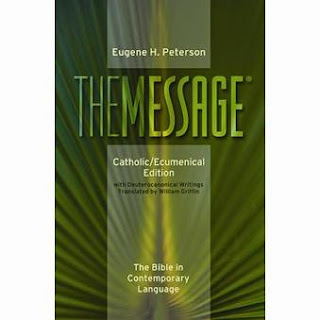Welcome back to another edition of Sunday's Message. Here, I will reproduce the readings for Mass from The Message: Catholic/Ecumenical Edition. (I want to thank Greg Pierce at ACTA for giving me permission to do this weekly post.) While this is not an "official" Catholic edition, one of my hopes for doing this new series is to have a lively discussion on the renderings, compared to the more formal ones we are use to reading and hearing at Mass. Is there a place for a translation like this? Could this be a good Bible to give to a Catholic "seeker" or young adult? I have used it while teaching my high school theology classes, along with the NRSV and NABRE, and have had positive results.
I would like to also propose a question or offer an encouragement each week to reflect upon, particularly in light of the rendering found here in The Message: How does your faith lead to good works on a daily basis?
Isaiah 50:4-9
The Master, God, has given me
a well-taught tongue,
So I know how to encourage tired people.
He wakes me up in the morning,
Wakes me up, opens my ears
to listen as one ready to take orders.
The Master, God, opened my ears,
and I didn’t go back to sleep,
didn’t pull the covers back over my head.
I followed orders,
stood there and took it while they beat me,
held steady while they pulled out my beard,
Didn’t dodge their insults,
faced them as they spit in my face.
And the Master, God, stays right there and helps me,
so I’m not disgraced.
Therefore I set my face like flint,
confident that I’ll never regret this.
My champion is right here.
Let’s take our stand together!
Who dares bring suit against me?
Let him try!
Look! the Master, God, is right here.
Who would dare call me guilty?
Psalm 116
I love
God because he listened to me,
listened as I begged for mercy.
He listened so intently
as I laid out my case before him.
Death stared me in the face,
hell was hard on my heels.
Up against it, I didn’t know which way to turn;
then I called out to God for help:
“Please,
God!” I cried out.
“Save my life!”
God is gracious—it is he who makes things right,
our most compassionate God.
God takes the side of the helpless;
when I was at the end of my rope, he saved me.
I said to myself, “Relax and rest.
God has showered you with blessings.
Soul, you’ve been rescued from death;
Eye, you’ve been rescued from tears;
And you, Foot, were kept from stumbling.”
I’m striding in the presence of
God,
alive in the land of the living!
James 2:14-18
Dear friends, do you think you’ll get anywhere in this if you learn all the right words but never do anything? Does merely talking about faith indicate that a person really has it? For instance, you come upon an old friend dressed in rags and half-starved and say, “Good morning, friend! Be clothed in Christ! Be filled with the Holy Spirit!” and walk off without providing so much as a coat or a cup of soup—where does that get you? Isn’t it obvious that God-talk without God-acts is outrageous nonsense?
I can already hear one of you agreeing by saying, “Sounds good. You take care of the faith department, I’ll handle the works department.”
Not so fast. You can no more show me your works apart from your faith than I can show you my faith apart from my works. Faith and works, works and faith, fit together hand in glove.
Mark 8:27-35
Jesus and his disciples headed out for the villages around Caesarea Philippi. As they walked, he asked, “Who do the people say I am?”
“Some say ‘John the Baptizer,’” they said. “Others say ‘Elijah.’ Still others say ‘one of the prophets.’”
He then asked, “And you—what are you saying about me? Who am I?”
Peter gave the answer: “You are the Christ, the Messiah.”
Jesus warned them to keep it quiet, not to breathe a word of it to anyone. He then began explaining things to them: “It is necessary that the Son of Man proceed to an ordeal of suffering, be tried and found guilty by the elders, high priests, and religion scholars, be killed, and after three days rise up alive.” He said this simply and clearly so they couldn’t miss it.
But Peter grabbed him in protest. Turning and seeing his disciples wavering, wondering what to believe, Jesus confronted Peter. “Peter, get out of my way! Satan, get lost! You have no idea how God works.”
Calling the crowd to join his disciples, he said, “Anyone who intends to come with me has to let me lead. You’re not in the driver’s seat; I am. Don’t run from suffering; embrace it. Follow me and I’ll show you how. Self-help is no help at all. Self-sacrifice is the way, my way, to saving yourself, your true self.










